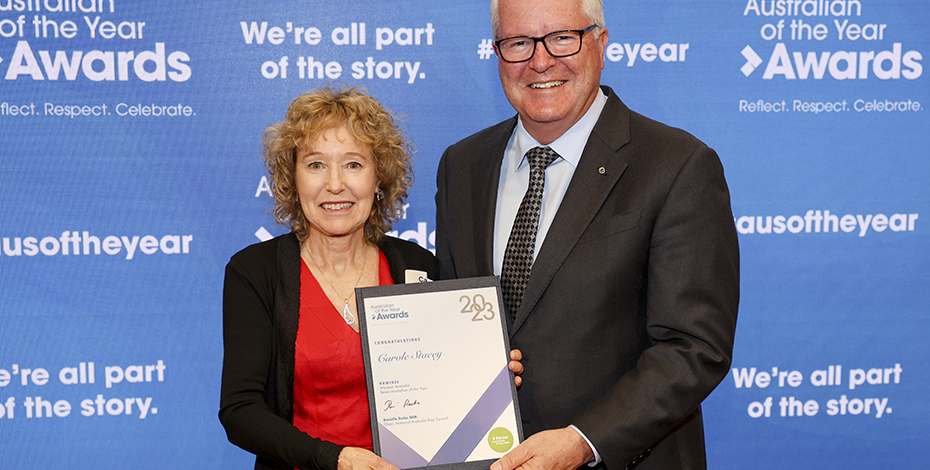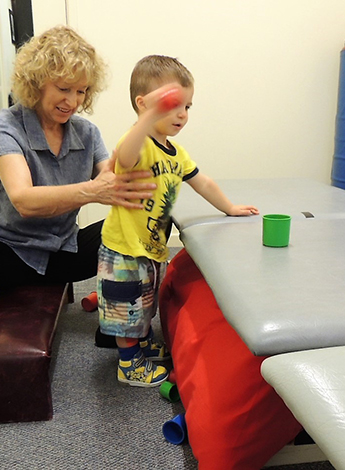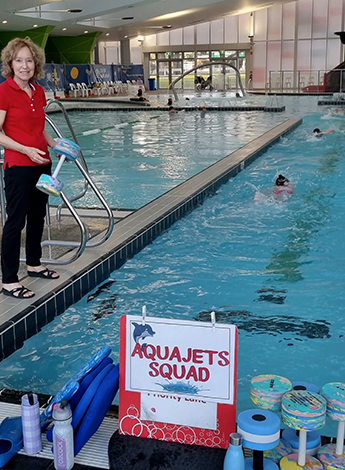
Award for a lifetime caring for kids

Having recently been recognised in the Australian of the Year Awards for her work in paediatric physiotherapy in Western Australia, retired physiotherapist Carole Stacey talks about the early influences that shaped her career and her passion for working with young people.
Like her father before her, Carole Stacey APAM has a natural affinity for working with children.
Her father Bernard Gook was the minister at St John’s Anglican Church in Darlinghurst in the 1970s and Carole attended a school nearby.
Her father ran a club and camps for teenagers in what were then the disadvantaged inner suburbs of Sydney. Many of the children had social, drug or domestic issues.
Carole admired his ability to understand and help children and teenagers at their most vulnerable.
The fourth of six children, Carole was the first to go to university and was encouraged to pursue physiotherapy by her mother Joyce, who had been a nurse in England during World War II.
Like many women of her generation, Joyce had stopped working when she married Bernard.
Both parents had a significant influence on a young Carole, with Joyce running hostels and a netball team for girls from country New South Wales who travelled to Sydney to study and work.

Working with children with disabilities formed a large part of Carole’s work throughout her career. She recently retired as a physiotherapist.
Carole worked part-time jobs to support herself through her science degree at the University of New South Wales and then, in 1976, a postgraduate diploma in physiotherapy at the then-Cumberland College of Health Sciences.
This included a six-week paediatric student unit at the Royal Alexandra Hospital for Children (now the Children’s Hospital at Westmead), which was to have a profound influence on her future career.
She was taught by some of the biggest names in paediatric and neurological physiotherapy at that time, including Roberta Shepherd and Janet Carr.
The postgraduate course and later work in the community south of Wollongong inspired Carole to embark on a career organised around working with children.
‘As a student I was always interested in paediatrics but it was all starting to come together for me at that point,’ Carole says.
It was during her postgraduate degree that Carole met her future husband Alan, who would go on to become a musculoskeletal physiotherapist.
Like many recently graduated students, Carole wanted to see the world and set off on a solo 18-month trip to work, study and enjoy life abroad.
While she was overseas, Carole undertook a Bobath course with the original founders, Dr Karel and Berta Bobath, and she credits it for helping her to broaden her skills in other areas, including children’s fine motor and sensory skills, especially children with cerebral palsy.
Returning home to Australia with very little money, Carole worked her way over to Western Australia, where she reconnected with Alan and decided to make it her home state.
Initially, Carole took on holiday relief work for the Western Australian Department of Health, including one particularly memorable posting to Karratha, in the Pilbara region, about 1500 kilometres north of Perth.
The arrangement was to include accommodation while she was working in the town, but the only room available for Carole was at the local hospital nurses’ accommodation.
‘It had very cold air conditioning; I remember that well,’ Carole says.
‘It was 50 degrees outside and arctic inside. I really enjoyed the work in the Pilbara.
‘One of many interesting places I visited was Strelley Station, run by the local Aboriginal community.
'Non-Indigenous people did not go there very often but I went out with a medical team because an Elder and a child had lung infections and they needed treatment,’ she says.
‘It was challenging for a young, city-trained physiotherapist because I was quite naive when it came to cultural sensitivities, especially with the Elder.
'I was an asthmatic and could relate to having things wrong with my lungs and because I was careful with what I did, he was relaxed about my treating him.’
In 1982 the couple decided to go into private practice together and Carole suggested a place she had visited in her working travels around Western Australia— Mandurah.
Located on the south-west coast near Pinjarra, Mandurah was without private practice physiotherapy services at that time, making it a prime location for the couple to set up in the community.
‘Initially we both travelled between Mandurah and Perth for work while trying to get the practice going.
'I was working at what was then called the Spastic Welfare Association of Western Australia (now Ability WA) in Perth.
'There was no train then so we were driving up and down, an hour each way.
‘In 1985 I was employed as a paediatric physiotherapist at the Mandurah Community Health Centre through the Western Australian Department of Health.
'They’d never had a paediatric physio in Mandurah before and it was very hard work because people didn’t recognise the need for paediatric physiotherapy.
'They’d say, “What do you do for children? Why do children need physio?”’
Carole then set up the paediatric service at the centre, having to gradually prove that there was a need for paediatric physiotherapy.
After settling in Mandurah, the couple welcomed the first of their two children and while on maternity leave Carole busied herself with taking on another challenge in the town, that of lobbying for a safe, well-designed playground to meet the community’s needs.
The project drew on her experience as a physiotherapist as well as her skills in planning play areas for children with disabilities and she studied the design of playground equipment and accessibility issues.
‘When I had my second child, I decided to have two years off from work, but I couldn’t stop completely,’ Carole says.
‘I was involved in setting up a group that supported families called Network Family Support.
'We were looking at what was needed in the community and one of the things that came up was a fenced playground where we could take our kids, one that would be safe and accessible.
'So that’s what I decided to do, set up the playground. And it wasn’t just for children with disabilities; it was for parents with prams, parents of toddlers, grandparents with mobility issues.
'We wanted something that was accessible to all, so we created what is now the Caterpillar Playground.’
In 1994, Carole won a Year of the Family Award for Outstanding Achievement to Western Australian Families for her community work and establishment of the Caterpillar Playground.
Throughout her career, Carole predominantly worked with preschool and school-aged children with neurological, developmental and orthopaedic issues and in adult neurology.
She also undertook aquatic physiotherapy for adults and children. She was a National Disability Insurance Scheme provider and has assisted in teaching and mentoring physiotherapists and students.

Carole led the Aquajets Swim and Exercise Squad as the swimming coach, with an interest in water for therapy.
Carole was also a swimming coach for many years, teaching children with and without disabilities, some of whom competed in competitions, while others just enjoyed the water for therapy.
In 2020 Carole was recognised for her contribution to the profession when she was awarded the Contribution to the Community Award by the APA Western Australian branch.
She retired from active clinical physiotherapy in July 2021 and was nominated for the 2023 Western Australian Senior Australian of the Year Award in November 2022, becoming a finalist.
She attended an awards ceremony and was presented with a certificate by the Governor of Western Australia, the Honourable Christopher Dawson.
Carole’s children have followed in the family footsteps of caring in the community; her elder daughter is a physiotherapist and has two children of her own, while her younger daughter works as a counselling psychologist with carers in residential group homes for children and young teenagers in care.
‘Both of them are in caring jobs, which is great,’ Carole says.
‘I would like to help physiotherapists to be more interested in paediatric physiotherapy so that we have more therapists who are trained to work with children.
'It can be a very interesting and varied occupation, although challenging,’ she says.
There is life after retirement for Carole, who volunteers in a local pre-primary school and at the pool weekly to run the Aquajets Swim and Exercise Squad, which caters for children aged nine to 15 years who have medical and other conditions.
© Copyright 2025 by Australian Physiotherapy Association. All rights reserved.





